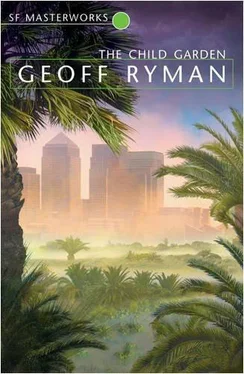The Princess, the mother of the child, was with them, puce-pale and haggard from wishing she was more heartless. When Berowne had become pregnant, the Princess had tried to pretend that, beyond donating the ovum, she would have nothing to do with it. But she was here, with him.
‘Cuh!’ she said, trying to speak. ‘Cuh-could suh-see.’ Her lips trembled against each other, as if they could lose their balance. ‘Fuh! From the Shuh-Shell.’
The Princess had begun to stammer in the spring. It was a virus. She had caught a virus, and it stopped her speaking. The only way she could speak smoothly, was to sing, to set the words to music. She refused to sing in public.
‘I wanted to be part of this,’ said Berowne, and held out his hands towards the spectacle. Even the septum of his nose had gone thin, the calcium leached from it. The wind stirred his thin hair as if with hope. The Princess hugged herself, forlornly.
On the pavements of the South Bank, the mosaic pattern of many people shifted and stirred. Costermen carried barrels of beer on their backs, helped by children. The children turned the taps and filled the mugs, and danced playing bamboo pipes. All along the walkway, there were giant ash trees, and the branches were crowded with people. Beefy workmen sat astride the branches as if they were horses’ backs and they lowered mugs on rope, down to the children to fill.
Over it all, dirigibles floated. Gondolas hung underneath them, full of people. Party members, of course. Tarries, thought Milena, the actress. They’re up there and we are down here.
Then from underneath Milena, there came singing.
Singing of sort, a kind of humming. The tide had gone out, and the river bed was shingled and muddy, heavy with the broken glass and torn rubber of history. Out from under the bridge came people. They moved across the mud, in fits and starts, like flamingoes. They picked their way, heads bobbing back and forth, arms folded like wings. They stopped at once, all together, and stood on one leg, transfixed. All of them tilted their heads together in one direction, as if listening to something. Then they suddenly scurried forward, all in a flock.
‘Don’t look at them,’ said Cilia, for whom any form of extreme behaviour was only a way of attracting attention.
Mud coated their heads like helmets, and they wore tatters of resin, bound to their bodies by nylon cord.
‘Those are Bees,’ said Berowne.
Milena had never seen Bees before: they had been only a dim rumour for her. It was said that people’s minds were becoming disrupted. Their minds were becoming disrupted in unison.
As Milena watched, all the Bees dropped, like puppets whose strings have been cut. They dropped down all at once onto their knees. They kowtowed as if to an emperor and began to scoop, furiously, more mud over their heads.
‘They’re supposed to be Snide,’ said Berowne, ‘but in a funny way.’
‘Fuh-funny!’ exclaimed the Princess in fear and bitterness. She had not wanted to bear a child for the sake of her career. What career was there now for an actress who stammered?
There had been a change in climate, in many different ways. Behind the sunlight and celebration, everywhere there was an underlying tickle of fear and doubt. There were the Bees; now there was the stammering. People knew that something was going wrong with the viruses. They still did not want to think about it; they still did not know what to do about it; and so they came here to celebrate something new and good.
On the embankment, the hurdy-gurdy men began to grind out fairground music faster than before. The costers began to call out the names of their wares with a gathering clamour, and a breeze began to blow, as if the river itself were stirring with anticipation. On Waterloo Bridge, people were standing up on horsecarts. People were lined up along the roofs of buildings or leaned out of windows. Milena’s viruses told her: you are looking at half a million people.
Across the river, on the face of the Shell-Mex, the hands of a giant clock were still. They had been still since the Blackout, the Revolution, ninety-seven years before. Tonight the hands would move, tonight at 10.30. There was enough metal now. The electricity would flow again, at first along the North Bank of the Thames only. But after that?
It was getting late. There was a sudden surge forward on the bridge as people tried to inch forward, to see. Milena pushed backwards. ‘Stop shoving!’ she said. ‘We’ve got a pregnant man here!’
‘Smile,’ said Berowne to the Princess, and took her hand. She looked down at his hand, and compared it with hers, and shook her head. Time was running out.
The people began to count, echoing their viruses.
‘TEN … NINE … EIGHT …’
In the mud below, the Bees were rocked by each giant number, buffeted by blasts of thought.
‘SEVEN … SIX …’
Milena thought: the town will be lit up at night. There will be film shows for the public on giant screens in parks. There will be videos. Different Estates will start vying for control of them. All of us are going to have to find different things to do.
‘FIVE … FOUR …’
Berowne turned to Milena, and nudged her, smiling wanly. This was why they had come. Join in!
‘Three,’ murmured Milena, wary of joining in a mass.
There will be a lot of sickness, she thought, a lot of new kinds of sickness.
‘TWO! ONE!’
In anticipation, horns began to blow, and whistles to screech. There was a dull roar of noise, barely intelligible.
‘ZERO!’
Nothing happened. There was a wave of laughter and ironic cheering as darkness deepened.
‘ZERO!’ the people called again. ‘MINUS ONE! MINUS TWO!’
At ‘minus two,’ there was a leaping of light. Bam! Suddenly light flooded the face of the Savoy hostel for the homeless. A chain of lights hanging from lamp posts came alive with light.
Bam! Spotlights were suddenly shining upwards on the face of the Shell Mex. It gleamed, newly washed against the navy blue of the sky. Lights came on in succession all along the North Bank, in the boat-houses and along the docks at the foot of the stone embankments. Light glinted on the granite length of Cleopatra’s Needle. Lights came on all along Waterloo Bridge. Bam, bam, bam, in quick time, pools of light, golden as if in sunset, spread in contrast to the darkness of the sky.
Oh! the people sighed. Oh! it was even more beautiful than they had thought it would be. They had all tried to imagine what it had once been like, the electric cities spangled with light, light in windows shining like eyes, and here it was, as if they had been transported in time. The electric city was reborn. This was to be called the Restoration.
The Bees leapt to their feet, shivering with other people’s delight, and they jittered up and down in place, wailing, warbling in tongues.
And on the face of the Shell-Mex, giant shadows slowly crept. The hands of the clock had begun to turn again, as if time had begun once more. It was as if the clockwork of change itself had started up once again.
Milena felt the artificial light prickling on her Rhodopsin skin. Everything is going to change, she thought. There would be power now, light and holograms. It would be possible to perform the Comedy.
All around her people whistled and stamped and cheered. Bam, bam, bam, the lights came on in succession, like memories.
And Milena remembered being in a vehicle that could orbit the Earth. It was alive, and it floated, swollen with gases like the throat of a frog. It rocked in the wind as it drifted upwards. Below her, Milena the director saw England swing in and out of view.
Milena saw huge autumn fields, golden brown with harvest. She saw lines of motion trailing through prairies of grain, blown by wind. It was as if the grain were the legs of the Earth. By waving them, the Earth turned. Between the fields, there were tiny copses of sycamore and beech. There was a river moving in a straight line, held by banks of coral. The shadow of the vehicle floated across the river, sending up a flock of ducks that flew in panic, the mass of their wings scintillating brown/white/brown as they flapped.
Читать дальше












